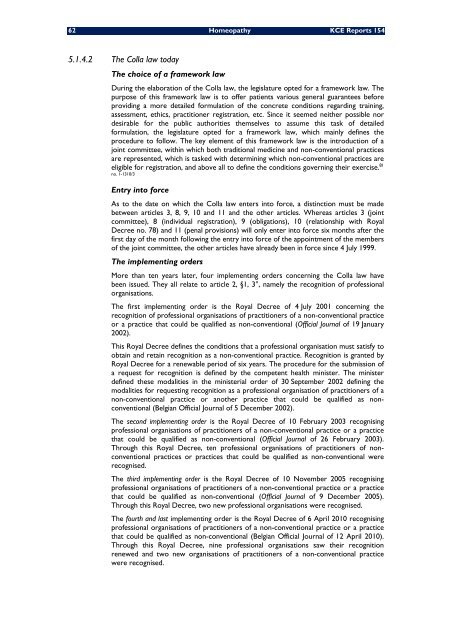Etat des lieux de l'homéopathie en Belgique - KCE
Etat des lieux de l'homéopathie en Belgique - KCE
Etat des lieux de l'homéopathie en Belgique - KCE
You also want an ePaper? Increase the reach of your titles
YUMPU automatically turns print PDFs into web optimized ePapers that Google loves.
62 Homeopathy <strong>KCE</strong> Reports 154<br />
5.1.4.2 The Colla law today<br />
The choice of a framework law<br />
During the elaboration of the Colla law, the legislature opted for a framework law. The<br />
purpose of this framework law is to offer pati<strong>en</strong>ts various g<strong>en</strong>eral guarantees before<br />
providing a more <strong>de</strong>tailed formulation of the concrete conditions regarding training,<br />
assessm<strong>en</strong>t, ethics, practitioner registration, etc. Since it seemed neither possible nor<br />
<strong><strong>de</strong>s</strong>irable for the public authorities themselves to assume this task of <strong>de</strong>tailed<br />
formulation, the legislature opted for a framework law, which mainly <strong>de</strong>fines the<br />
procedure to follow. The key elem<strong>en</strong>t of this framework law is the introduction of a<br />
joint committee, within which both traditional medicine and non-conv<strong>en</strong>tional practices<br />
are repres<strong>en</strong>ted, which is tasked with <strong>de</strong>termining which non-conv<strong>en</strong>tional practices are<br />
eligible for registration, and above all to <strong>de</strong>fine the conditions governing their exercise. 81<br />
no. 1-1310/3<br />
Entry into force<br />
As to the date on which the Colla law <strong>en</strong>ters into force, a distinction must be ma<strong>de</strong><br />
betwe<strong>en</strong> articles 3, 8, 9, 10 and 11 and the other articles. Whereas articles 3 (joint<br />
committee), 8 (individual registration), 9 (obligations), 10 (relationship with Royal<br />
Decree no. 78) and 11 (p<strong>en</strong>al provisions) will only <strong>en</strong>ter into force six months after the<br />
first day of the month following the <strong>en</strong>try into force of the appointm<strong>en</strong>t of the members<br />
of the joint committee, the other articles have already be<strong>en</strong> in force since 4 July 1999.<br />
The implem<strong>en</strong>ting or<strong>de</strong>rs<br />
More than t<strong>en</strong> years later, four implem<strong>en</strong>ting or<strong>de</strong>rs concerning the Colla law have<br />
be<strong>en</strong> issued. They all relate to article 2, §1, 3°, namely the recognition of professional<br />
organisations.<br />
The first implem<strong>en</strong>ting or<strong>de</strong>r is the Royal Decree of 4 July 2001 concerning the<br />
recognition of professional organisations of practitioners of a non-conv<strong>en</strong>tional practice<br />
or a practice that could be qualified as non-conv<strong>en</strong>tional (Official Journal of 19 January<br />
2002).<br />
This Royal Decree <strong>de</strong>fines the conditions that a professional organisation must satisfy to<br />
obtain and retain recognition as a non-conv<strong>en</strong>tional practice. Recognition is granted by<br />
Royal Decree for a r<strong>en</strong>ewable period of six years. The procedure for the submission of<br />
a request for recognition is <strong>de</strong>fined by the compet<strong>en</strong>t health minister. The minister<br />
<strong>de</strong>fined these modalities in the ministerial or<strong>de</strong>r of 30 September 2002 <strong>de</strong>fining the<br />
modalities for requesting recognition as a professional organisation of practitioners of a<br />
non-conv<strong>en</strong>tional practice or another practice that could be qualified as nonconv<strong>en</strong>tional<br />
(Belgian Official Journal of 5 December 2002).<br />
The second implem<strong>en</strong>ting or<strong>de</strong>r is the Royal Decree of 10 February 2003 recognising<br />
professional organisations of practitioners of a non-conv<strong>en</strong>tional practice or a practice<br />
that could be qualified as non-conv<strong>en</strong>tional (Official Journal of 26 February 2003).<br />
Through this Royal Decree, t<strong>en</strong> professional organisations of practitioners of nonconv<strong>en</strong>tional<br />
practices or practices that could be qualified as non-conv<strong>en</strong>tional were<br />
recognised.<br />
The third implem<strong>en</strong>ting or<strong>de</strong>r is the Royal Decree of 10 November 2005 recognising<br />
professional organisations of practitioners of a non-conv<strong>en</strong>tional practice or a practice<br />
that could be qualified as non-conv<strong>en</strong>tional (Official Journal of 9 December 2005).<br />
Through this Royal Decree, two new professional organisations were recognised.<br />
The fourth and last implem<strong>en</strong>ting or<strong>de</strong>r is the Royal Decree of 6 April 2010 recognising<br />
professional organisations of practitioners of a non-conv<strong>en</strong>tional practice or a practice<br />
that could be qualified as non-conv<strong>en</strong>tional (Belgian Official Journal of 12 April 2010).<br />
Through this Royal Decree, nine professional organisations saw their recognition<br />
r<strong>en</strong>ewed and two new organisations of practitioners of a non-conv<strong>en</strong>tional practice<br />
were recognised.

















